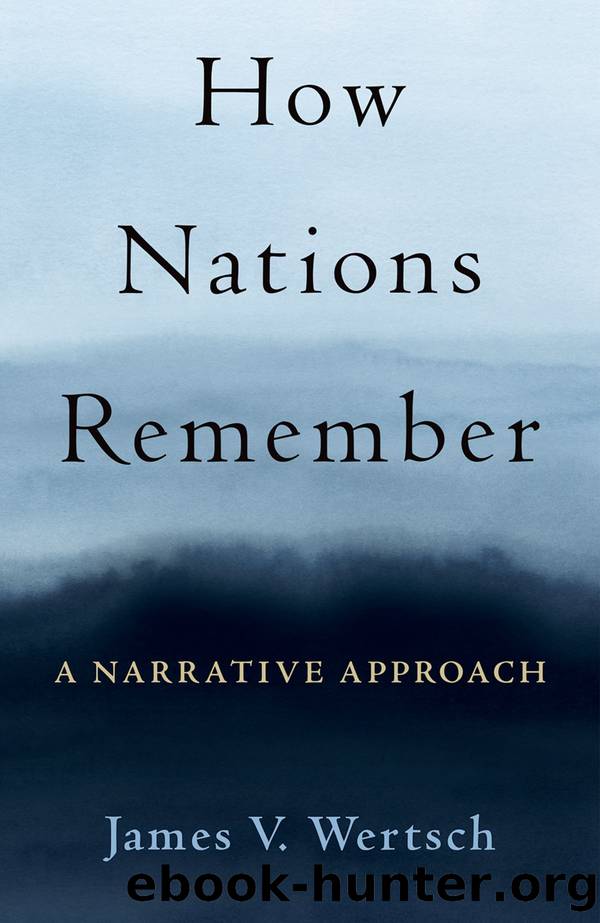How Nations Remember by James V. Wertsch

Author:James V. Wertsch
Language: eng
Format: epub
Publisher: Oxford University Press
Published: 2021-10-15T00:00:00+00:00
4.3.2. The Century of Humiliation as a PEN for China
For members of the Chinese national community, the Century of Humiliation story serves as a privileged lens in ways similar to how the Great Patriotic War does for the Russian community. It is a story about the humiliation of China in the Opium Wars with England and other European powers in the 1840s and includes other chapters of humiliation at the hands of the West and Japan, including the first Sino-Japanese (1894â1895), the Boxer Rebellion (1900), the dismemberment of Chinese territory in the wake of World War I, and the Japanese invasion of China in the 1930s. This century came to an end in 1949 when Mao Zedong announced that China was finally able to rise up off its knees.
Zheng Wang (2012) has documented the relentless efforts in schools and other settings to ensure that Chinese citizens ânever forget national humiliation,â and as a result, the slogan is known to virtually every Chinese citizen. It is part of the âhistorical consciousness and its complex of myth and trauma [that] are the dominant ideas in Chinese public rhetoricâ (p.xiii). Wang argues that this is part of a rhetoric of âchosen gloryâ (p.37), a framework in which âChinese view themselves as possessing both a strong sense of both cultural and moral superiorityâ (p.47), which makes the events of 1840 to 1949 seem particularly humiliating by contrast. Indeed, it might be argued that assumptions about cultural superiority are what make it possible for the Chinese to be secure enough to talk about humiliation in the first place and include it in the title of this national narrative. It is a term that virtually no other modern country makes overt in its account of the past even though national communities invariably can point to at least one humiliating episode.
This combination of moral superiority and humiliation has been a focus of intense discussion for decades in China. It can be found in the writings of Lu Xun (1881â1936), for example, a writer whose powerful impact on Chinese society remains to this day. In A Madmanâs Diary, Lu (2014) recounts the shock of being awakened to Chinaâs weakened state when he saw a photo of a Japanese soldier beheading a Chinese captive from the Russo-Japanese War of 1904â1905. What he found particularly disturbing was the passive, indeed apathetic, state of the Chinese witnesses in the photo. For him, this was a starting point for anguished self-criticism and a call to action by the Chinese. His unforgiving criticism of the slavish mentality, timidity, and passivity by the Chinese was the topic of many of his essays and short stories that are part of the curriculum of Chinaâs schools today and are widely known in the general public.
These and other efforts by the Chinese state have contributed to a set of habits around the Century of Humiliation story, making it into a PEN. Wang (2012) points to elements of the schematic nature of this narrative when writing of how historical memory âfunctions at a preconscious or subconscious levelâ (p.
Download
This site does not store any files on its server. We only index and link to content provided by other sites. Please contact the content providers to delete copyright contents if any and email us, we'll remove relevant links or contents immediately.
| Africa | Americas |
| Arctic & Antarctica | Asia |
| Australia & Oceania | Europe |
| Middle East | Russia |
| United States | World |
| Ancient Civilizations | Military |
| Historical Study & Educational Resources |
The Bomber Mafia by Malcolm Gladwell(1184)
Submerged Prehistory by Benjamin Jonathan; & Clive Bonsall & Catriona Pickard & Anders Fischer(1162)
Facing the Mountain by Daniel James Brown(1136)
The Dawn of Everything by David Graeber & David Wengrow(1112)
The Way of Fire and Ice: The Living Tradition of Norse Paganism by Ryan Smith(1033)
Wandering in Strange Lands by Morgan Jerkins(1019)
Tip Top by Bill James(1004)
Driving While Brown: Sheriff Joe Arpaio Versus the Latino Resistance by Terry Greene Sterling & Jude Joffe-Block(1003)
Evil Geniuses: The Unmaking of America: A Recent History by Kurt Andersen(1001)
Red Roulette : An Insider's Story of Wealth, Power, Corruption, and Vengeance in Today's China (9781982156176) by Shum Desmond(1000)
F*cking History by The Captain(969)
It Was All a Lie by Stuart Stevens;(943)
White House Inc. by Dan Alexander(908)
Evil Geniuses by Kurt Andersen(903)
Treasure Islands: Tax Havens and the Men who Stole the World by Nicholas Shaxson(881)
American Dreams by Unknown(860)
American Kompromat by Craig Unger(850)
The Fifteen Biggest Lies about the Economy: And Everything Else the Right Doesn't Want You to Know about Taxes, Jobs, and Corporate America by Joshua Holland(817)
The First Conspiracy by Brad Meltzer & Josh Mensch(813)
